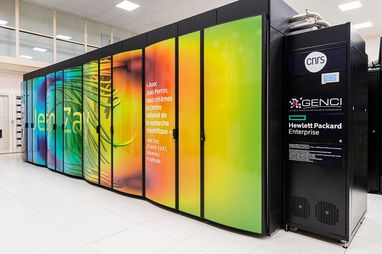- Community Home
- >
- HPE Community, France
- >
- Blog HPE, France
- >
- HPC Researchers Battle Against COVID-19 on Jean Za...
Catégories
Company
Local Language
Forums
Forum de discussion
Forums
- Data Protection and Retention
- Entry Storage Systems
- Legacy
- Midrange and Enterprise Storage
- Storage Networking
- HPE Nimble Storage
Forum de discussion
Forum de discussion
Forum de discussion
Forum de discussion
Forums
Forum de discussion
Discussion Boards
Discussion Boards
Discussion Boards
Discussion Boards
- BladeSystem Infrastructure and Application Solutions
- Appliance Servers
- Alpha Servers
- BackOffice Products
- Internet Products
- HPE 9000 and HPE e3000 Servers
- Networking
- Netservers
- Secure OS Software for Linux
- Server Management (Insight Manager 7)
- Windows Server 2003
- Operating System - Tru64 Unix
- ProLiant Deployment and Provisioning
- Linux-Based Community / Regional
- Microsoft System Center Integration
Discussion Boards
Discussion Boards
Discussion Boards
Discussion Boards
Discussion Boards
Discussion Boards
Discussion Boards
Discussion Boards
Discussion Boards
Discussion Boards
Discussion Boards
Discussion Boards
Discussion Boards
Discussion Boards
Discussion Boards
Discussion Boards
Discussion Boards
Discussion Boards
Discussion Boards
Communauté
Contact
Forums
Blogs
- S'abonner au fil RSS
- Marquer comme nouveau
- Marquer comme lu
- Marquer
- S'abonner
- Page imprimable
- Signaler un contenu inapproprié
HPC Researchers Battle Against COVID-19 on Jean Zay Supercomputer

In an urge to understand the molecular structure of the virus, over thirty worldwide scientists from six renowned institutions (Sorbonne Université, Conservatoire National des Arts et Métiers, Université de Limoges, University of Texas at Austin, University of North-Texas and Washington University in Saint Louis) lead by Jean-Philip Piquemal are collaborating to simulate and target the functional proteins of the #COVID19 virus. Such computer models will help scientists to design new drugs able to neutralize the coronavirus by preventing it from entering human cells or by blocking its internal machinery.
Researchers are relying on an urgent-computing access mode to the most performant European converged HPC and AI operational supercomputer called “Jean Zay” (16 PFlop/s) and the fastest existing massively parallel multi-GPU approach #Tinker-HP. Running on Jean Zay supercomputer, Tinker-HP software solution, optimized by HPE, IDRIS and the developers team, offers a high-performance computing environment providing access to the modeling of complex systems of up to millions of atoms. It is the fastest approach currently available to perform state-of-the-art molecular dynamics simulations with high-resolution polarizable energy model allowing to capture viral infection mechanisms in most realistic details.
The Jean Zay supercomputer designed by HPE (Hewlett Packard Enterprise) and inaugurated in January 2020 was acquired by GENCI (Grand Equipement National de Calcul Intensif), the French HPC agency, and is operated within the IDRIS (Institut du Développement et des Ressources en Informatique Scientifique), the largest center for IA and numerical simulation of CNRS (Centre National de Recherche Scientifique).
- Group of Prof. J-P Piquemal (ERC EMC2, grant agreement No 810367), LCT, UMR 7616 CNRS, Sorbonne Université, Paris, France
- Group of Prof. M. Montes (ERC ViDock, grant agreement 640283), GBCM, CNAM, Hésam Université, Paris, France
- Group of Dr. M. Maria, XLIM,UMR 7252 CNRS, Université de Limoges, France
- Group of Dr. M. Nilges, Structural Bioinformatics, UMR 3528 CNRS, Institut Pasteur, Paris, France
- Group of Prof. P. Ren, Dept of Biomedical Engineering, University of Texas at Austin, TX, USA
- Group of Prof. J. W. Ponder, Dept of Chemistry, Washington University in Saint Louis, MO, USA
- Group of Prof. G. A. Cisneros, Dept of Chemistry, University of North Texas, TX, USA
Crédits photo : Cyril FRESILLON / IDRIS / CNRS Photothèque
- Retour au blog
- Article plus récent
- Article plus ancien
- stephane monpeurt sur : La région Côte d’Azur affiche sa volonté de jouer ...
- harithadadam sur : Windows Server 2019 : un système d'exploitation si...
- harithahari sur : Nos incontournables des sessions HPE Discover Virt...
- Binotto sur : Programme HPE d’accélération de start-up : Une exp...
- Nicolas_W sur : Comprendre le modèle de licence de Windows Server ...
- Joanna_K sur : Comprendre les nouvelles fonctionnalités de Window...
- Nicolas_W sur : Installez facilement Windows Server 2019 sur des s...
- Nicolas_W sur : Tout sur les licences HPE OEM Windows Server 2019
- HumanSourcing sur : Avec BlueData, HPE lance le « Big data, Machine Le...
- Nicolas_W sur : Les licences OEM Windows Server 2019 sont désormai...

